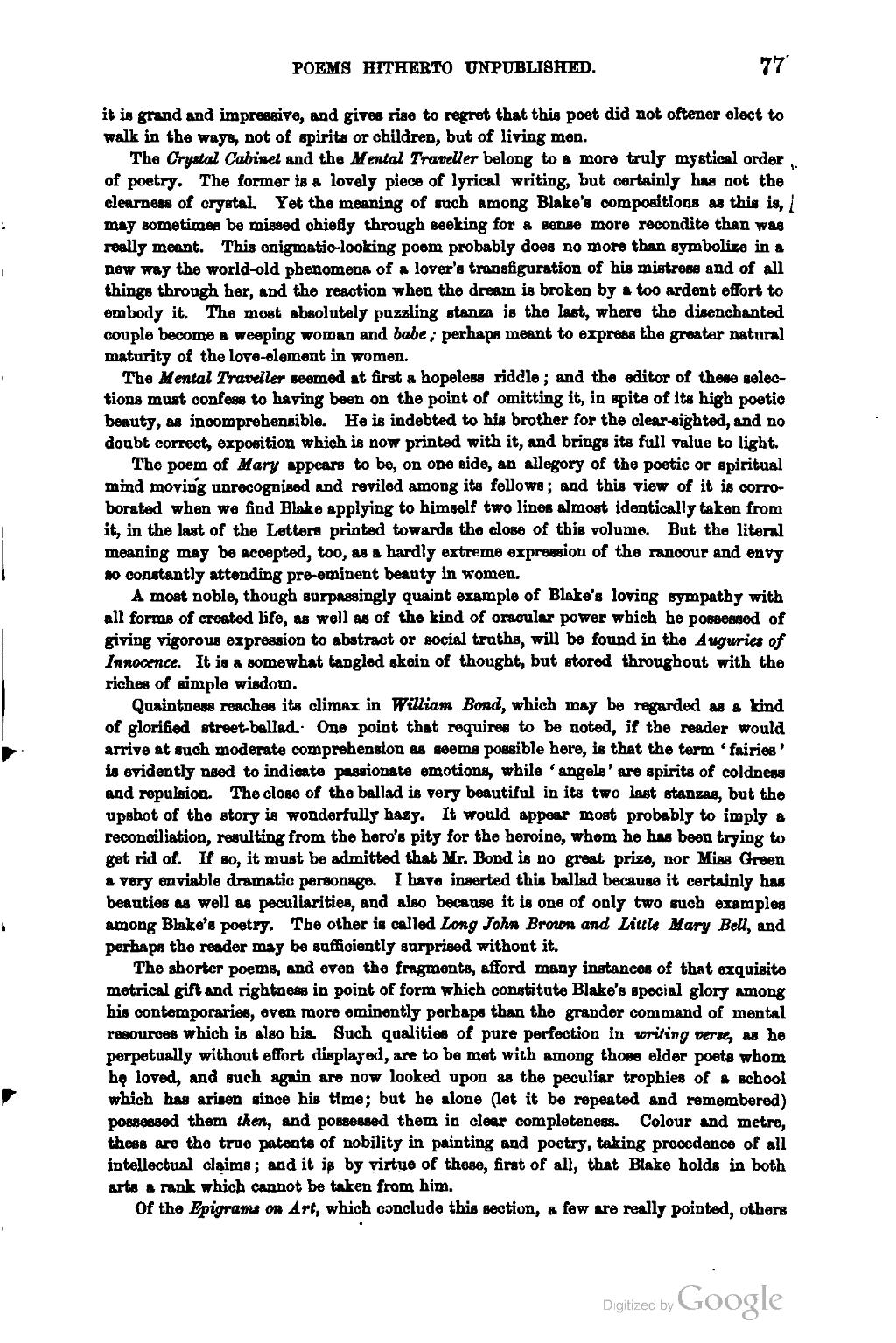it is grand and impresive, and gives rise to regret that this poet did not oftener elect to walk in the ways, not of spirits or children, but of living men.
The Crystal Cabinet and the Mental Traveller belong to a more truly mystical order of poetry. The former is a lovely piece of lyrical writing, but certainly has not the clearness of crystal. Yet the meaning of such among Blake's compositions as this is, may sometimes be missed chiefly through seeking for a sense more recondite than was really meant. This enigmatio-looking poem probably does no more than symbolize in a new way the world-old phenomena of a lover's transfiguration of his mistress and of all things through her, and the reaction when the dream is broken by a too ardent effort to embody it. The most absolutely puzzling stanza is the last, where the disenchanted couple become a weeping woman and babe; perhaps meant to express the greater natural maturity of the love-element in women.
The Mental Traveller seemed at first & hopeless riddle; and the editor of these selections must confess to having been on the point of omitting it, in spite of its high poetic beauty, as incomprohensible. He is indebted to his brother for the clear-sighted, and no doubt correct, exposition which is now printed with it, and brings its full value to light.
The poem of Mary appears to be, on one side, an allegory of the poetic or spiritual mind moving unrecoguised and reviled among its fellows; and this view of it is corroborated when we find Blake applying to himself two lines almost identically taken from it, in the last of the Letters printed towards the close of this volume. But the literal meaning may be accepted, too, as a hardly extreme expression of the rancour and envy so constantly attending pro-eminent beauty in women.
A most noble, though surpessingly quaint example of Blake's loving sympathy with all forms of created life, as well a of the kind of oracular power which he possessed of giving vigorous expression to abstract or social truths, will be found in the Auguries of Innocence. It is & somewhat tangled skein of thought, but stored throughout with the riches of simple wisdom.
Quaintness reaches its climax in William Bond, which may be regarded as a kind of glorified street-ballad. One point that requires to be noted, if the reader would arrive at such moderate comprehension as seems possible here, is that the term 'fairies' is evidently used to indicate passionate emotions, while 'angels' are spirits of coldness and repulsion. The close of the ballad is very beautiful in its two last stanzas, but the upshot of the story is wonderfully hazy. It would appear most probably to imply a reconciliation, resulting from the hero's pity for the heroine, whom he has been trying to get rid of. If so, it must be admitted that Mr. Bond is no great prize, nor Miss Green a very enviable dramatic personage. I have inserted this ballad because it certainly has beauties as well as peculiarities, and also because it is one of only two such examples among Blake's poetry. The other is called Long John Brown and Little Mary Bell, and perhaps the reader may be sufficiently surprised without it.
The shorter poems, and even the fragments, afford many instances of that exquisite metrical gift and rightness in point of form which constitute Blake's special glory among his contemporaries, even more eminently perhaps than the grander command of mental resources which is also his. Such qualities of pure perfection in writing verse, as he perpetually without effort displayed, are to be met with among those elder poets whom he loved, and such again are now looked upon as the peculiar trophies of s school which has arisen since his time; but he alone (let it be repeated and remembered) possessed them tach, and possessed them in clear completeness. Colour and metre, these are the true patents of nobility in painting and poetry, taking precedence of all intellectual claims; and it ip by virtue of these, first of all, that Blake holds in both arts a rank which cannot be taken from him.
Of the Epigrams on Art, which conclude this section, a few are really pointed, others